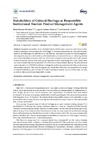Please use this identifier to cite or link to this item:
https://accedacris.ulpgc.es/jspui/handle/10553/57557
| DC Field | Value | Language |
|---|---|---|
| dc.contributor.author | Moreno-Mendoza, Héctor | - |
| dc.contributor.author | Santana-Talavera, Agustín | - |
| dc.contributor.author | León, Carmelo J. | - |
| dc.date.accessioned | 2019-10-31T11:28:13Z | - |
| dc.date.available | 2019-10-31T11:28:13Z | - |
| dc.date.issued | 2019 | - |
| dc.identifier.issn | 2071-1050 | - |
| dc.identifier.other | WoS | - |
| dc.identifier.uri | https://accedacris.ulpgc.es/handle/10553/57557 | - |
| dc.description.abstract | Increased competition in tourist destinations and the recent economic crisis directly affect various institutions that manage cultural heritage. In the case of museums, we may need to reflect more on the challenges that stem from the new financial and social situation for their management. The long-term analysis of relationships with stakeholders is a more reliable way of achieving stability to counteract the effects of income reduction. This study involved conducting interviews with directors of four museums, one for each existing management model, contrasting with direct observation and unstructured interviews conducted in Gran Canaria, Canary Islands (Spain). The data obtained were analyzed with UCINET (a software package for analyzing social network data), to determine relationship indicators. The research suggests that stakeholder networks, as a competitive advantage in cultural institutions, play an important role in creating or improving cultural heritage products, as well as helping to develop responsible tourism. | - |
| dc.language | eng | - |
| dc.relation.ispartof | Sustainability (Switzerland) | - |
| dc.source | Sustainability (Switzerland) [ISSN 2071-1050], v. 11 (5192) | - |
| dc.subject | 531290 Economía sectorial: turismo | - |
| dc.subject.other | Stakeholders | - |
| dc.subject.other | Heritage management | - |
| dc.subject.other | Responsible tourism | - |
| dc.subject.other | Responsible Tourism | - |
| dc.title | Stakeholders of cultural heritage as responsible institutional tourism product management agents | - |
| dc.type | info:eu-repo/semantics/article | - |
| dc.type | Article | - |
| dc.identifier.doi | 10.3390/su11195192 | - |
| dc.identifier.scopus | 85073631827 | - |
| dc.identifier.isi | 000493525500051 | - |
| dc.contributor.authorscopusid | 57209716675 | - |
| dc.contributor.authorscopusid | 57209719216 | - |
| dc.contributor.authorscopusid | 7101886256 | - |
| dc.identifier.eissn | 2071-1050 | - |
| dc.identifier.issue | 5192 | - |
| dc.relation.volume | 11 | - |
| dc.investigacion | Ciencias Sociales y Jurídicas | - |
| dc.type2 | Artículo | - |
| dc.contributor.daisngid | 31863166 | - |
| dc.contributor.daisngid | 7095343 | - |
| dc.contributor.daisngid | 597168 | - |
| dc.description.numberofpages | 14 | - |
| dc.contributor.wosstandard | WOS:Moreno-Mendoza, H | - |
| dc.contributor.wosstandard | WOS:Santana-Talavera, A | - |
| dc.contributor.wosstandard | WOS:Leon, CJ | - |
| dc.date.coverdate | Octubre 2019 | - |
| dc.identifier.ulpgc | Sí | es |
| dc.description.sjr | 0,581 | |
| dc.description.jcr | 2,576 | |
| dc.description.sjrq | Q2 | |
| dc.description.jcrq | Q2 | |
| dc.description.scie | SCIE | |
| dc.description.ssci | SSCI | |
| dc.description.erihplus | ERIH PLUS | |
| item.grantfulltext | open | - |
| item.fulltext | Con texto completo | - |
| crisitem.author.dept | GIR TIDES: Economía, medioambiente, sostenibilidad y turismo | - |
| crisitem.author.dept | IU de Turismo y Desarrollo Económico Sostenible | - |
| crisitem.author.dept | Departamento de Análisis Económico Aplicado | - |
| crisitem.author.orcid | 0000-0001-9451-4093 | - |
| crisitem.author.parentorg | IU de Turismo y Desarrollo Económico Sostenible | - |
| crisitem.author.fullName | León González, Carmelo Javier | - |
| Appears in Collections: | Artículos | |
SCOPUSTM
Citations
27
checked on Jun 8, 2025
WEB OF SCIENCETM
Citations
22
checked on Feb 8, 2026
Page view(s)
101
checked on Jun 1, 2024
Download(s)
187
checked on Jun 1, 2024
Google ScholarTM
Check
Altmetric
Share
Export metadata
Items in accedaCRIS are protected by copyright, with all rights reserved, unless otherwise indicated.
